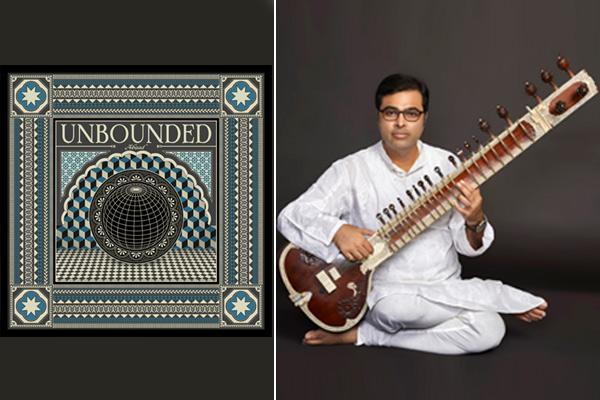For more on radio and music business news. | Click on RNMBiz

MUMBAI: Prolific collaborator and sitar maestro Purbayan Chatterjee will release his new star-studded collaborative album Unbounded (Abaad) from the UK-based, South Asian-focused music media platform Sufiscore.
The album reflects not only Chatterjee’s mastery of Indian classical music but also what he calls “his love story with jazz” and his inquisitive approach to music of all kinds, blending a wealth of colors from master musicians around the world. “I’m trying to create a sound that appeals to the greater diaspora,” Chatterjee says, “incorporating the nuances of Western harmony along with the embellishments and ornaments of Indian music in terms of my playing, my phrasing, my thinking.”
Joining him in this endeavor are musicians of the highest caliber with a like-minded global sensibility, including banjo pioneer Béla Fleck (whose duo work with the late Chick Corea was formative for Chatterjee); keyboardist Jordan Rudess of the progressive metal band Dream Theater; longtime Pat Metheny drummer Antonio Sanchez; Snarky Puppy bassist and founder Michael League; and acclaimed jazz clarinetist Anat Cohen.
Among the eminent Indian musicians featured are Ustad Zakir Hussain (tabla), V. Selvaganesh (kanjira) and Shankar Mahadevan (vocals), all of whom worked with the great John McLaughlin in his innovative acoustic fusion project Shakti. “I think to a lot of Indian listeners, Shakti is the first door through which we see cross-cultural collaborative music,” Chatterjee maintains. “As crossover musicians we revere Shakti because of the way John ji explored the Carnatic tradition and beautifully found a harmonic context to it. Zakir bhai also embodies that bridge, much like Pandit Ravi Shankar did in the ’60s and ’70s. He’s been a mentor and esteemed colleague. You hear so many elements of Latin percussion in the way he plays the tabla, in addition to the North and South Indian traditions.”
Though Chatterjee composed the songs, each one enfolds the ideas and personalities of various co-collaborators along the way. Many others appear as special guests — ace session players who fulfilled a highly important role. With the opening “Shanmukhapriya (The Mystic),” we hear an exploration of “the devotional element of Carnatic music in a post-modern Latin jazz soundscape,” steered by the production and keyboards of Nakul Chugh, the mandolin mastery of U. Rajesh, the guitar of Indonesian native Aleif Hamdan and the subtle textural effect of the strings (cellist Emanuel Keller, violist Anna Stromer, violinist Bengisu Gökçe).
“Khula Asmaan (Firmament),” with lyrics by Pinky Poonawala sung by the Indian master Javed Ali, combines Rudess’ dizzying keyboards and Guy Bernfeld’s electric bass with the animated world percussion of Taufiq Qureshi, the drumming of Darshan Doshi and the guitar and flute of Rickraj and Paras Nath respectively. This complex prog-rock whirlwind, inspired by the traditions of Sufi Islam, is “a cross between a classical bandish [fixed melodic composition] and a Sufi kalam [devotional song],” Chatterjee notes.
Hussain, Sanchez and League exhibit a tremendous rhythm section hookup on “Sukoon (Catharsis),” a marriage of ghazal and blues that juxtaposes the jazz and Hindustani vocal stylings (respectively) of Thana Alexa and Gayatri Asokan (lyrics by Rehana Qamar). Pianist Carmen Staaf supplies the harmony, setting the stage for Gary Husband’s later appearances.
On this song and throughout, there’s a stunning degree of cohesion as the ensembles execute unison parts of blazing speed and high difficulty with an effortless natural feeling.
Anat Cohen comes onboard to evoke the streets of New York with her poignant clarinet on “Intezaar (The Wait),” with lyrics by Ashishh Pandit, sung by Pratibha Singh Baghel and Ustad Rashid Khan. The song is a journey: amid the seductive groove of Husband’s drumming and the brilliance of his piano interlude, Cohen goes toe-to-toe with Chatterjee in an invigorating round of clarinet/sitar trading and call-and-response. Insinuated into the mix is the wonderful timbre of the sarangi, played by Sabir Khan.
“Lalitha (The Joyful Mother)” is Béla Fleck’s turn to mix it up with Hussain and League, in a piece with trenchant vocals by Mahadevan and Mame Khan, the great “folk voice of Rajasthan.” Aleif Hamdan’s earthy acoustic rhythm guitar hints at American roots music, somehow fitting for this concordance of two seldom-paired instruments, banjo and sitar.
Finally, “Unbounded (Abaad)” is a dreamy out-of-tempo transition piece, with Asokan invoking the recurring chant “vasudeva kutumbakam” (“the world is one family”), capturing the message of the album as a whole. Husband’s piano, Deepak Pandit’s violin and Mark Hartsuch’s saxophone are colors that carry over into the grand finale, “New Beginnings,” with superb guitar stylings from Rhythm Shaw, imaginative drumming from Shikhar Naad and a compelling League bass solo as well.
In all, Unbounded (Abaad) showcases “six different kinds of music from our subcontinent, brought into close contact with six different styles from jazz and other realms,” Chatterjee concludes. “Improvisation is the most common connection point. The language of music can take you from one realm to the other — to feel that sense of being ‘looked after,’ essentially. Through it you’re finding a mode of communication with a greater energy, a common energy that binds us all together.”
Unbounded (Abaad) will release worldwide on September 10 on Sufiscore.